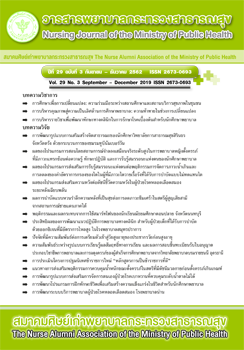Quality Management for Excellence in Nursing Education: Challenges during Transformation
Main Article Content
Abstract
At present, higher education institutions are facing many social changes. The organization must adjust itself to keep pace with changes in order to improve the quality of the organization. The administrators must develop quality management plans to achieve the goal of educational excellence. This is the challenge of nursing education administrators; to build confidence of the society regarding graduate quality, including increasing the opportunity to compete in the quality of nursing graduates.
The “Par ADVICE” quality management process consists of 4 participation processeses which are 1) Participation in decision making, 2) Participation in implementation and responsibility 3) Participation in evaluation and development and 4) Participation in benefits resulting from the outcomes achieved, plused 5 steps of management process (ADVICE) including Analysis of organization and aims of quality, Design of quality management plan, Vision driving to actions based on participatory process, Implementation and Continually learning within quality culture, and Evaluation. The Par ADVICE model has the advantage of being a participatory management model, from the participation of personnel in its planning to their participation in the benefits of the model, with a focus on both personnel and students. There is a starting point from the analyses of goals which leads to the design of a quality management plan in response to the educational outcomes and to challenge the organizations to develop results beyond the standard.
Article Details
บทความและรายงานวิจัยในวารสารพยาบาลกระทรวงสาธารณสุข เป็นความคิดเห็นของ ผู้เขียน มิใช่ของคณะผู้จัดทำ และมิใช่ความรับผิดชอบของสมาคมศิษย์เก่าพยาบาลกระทรวงสาธารณสุข ซึ่งสามารถนำไปอ้างอิงได้
References
2. Natongbojaras T. The quality of administration of the primary level education school, Bueng Gum Area, Private Educational Office, Bangkok [master thesis]. Chiang Rai: Chiang Rai Rajabhat University;2010. (in Thai).
3. Prombuasri P, Malai C, Chaiyoyingyong R, Kitnopkial K. The developmentof quality management model enhancing educational quality among nursing colleges under the jurisdiction of Praboromarajchanok Institute, Ministry of Public Health. Journal of Nursing and Education 2017;10(1):44-63. (in Thai).
4. Likitpongwit B, Intarak P. The excellence factors for nursing college administration under the Ministry of Public Health. The Southern College Network Journal of Nursing and Public Health 2017;4(1):119. (in Thai).
5. Yorke M. “This Wat QA?”. Quality Assurance in Education 1997;5:97-100.
6. Marshood S. Quality assurance in Australian higher education: historical and future development. Asia Pacific Educ 2011;12:475-83.
7. Misiunas M. Internal quality assurance system and its implementation in Kaunas College. Quality of Higher Education 2007;4:38-52.
8. Jani H. Modeling total quality management in higher education with case based learning. JNIT 2012;3:99-109.
9. Dill DD. Through Deming, s eyes: a cross national analysis of quality assurance policies in higher education.
Quality in Higher Education 1995;1(2):95-110.
10. Joyce B, Weil M, Showers B. Models of teaching. 4thed. Massachusetts: Ally and Bacon; 1992.
11. Thongchai A, Morachot N, Julsuwan S. Participation model in development of internal quality assurance of small-size school under the Secondary Education Service Area Office 28. Journal of Education, Mahasarakham University 2015;9 (suppl):891-906. (in Thai).
12. Seangsuwan O. A development of participative management model for basic educational quality assurance system under Nonthaburi Educational Service. [Dissertation]. Bangkok: North Bangkok University; 2013. (in Thai).
13. Ibara CE. Developing quality assurance culture for sustainable university education in Nigeria. Journal of Education and Practice 2015;6(29):142-47.
14. Thongsamsi A, Jaikeaw A, Churngchow C, Thipparat T. Quality culture of the workforce in public higher education institutions: a mixed methods approach. Rajamangala University of Technology Srivijaya 2013; 5(1):1-16. (in Thai).
15. Evans CJ, Francis Shackell E, Jean Kerr-Wilson S, Joan Doyle G, McCutcheon JA, Budz B. A faculty created strategic plan for excellence in nursing education. Int J NursEducScholarsh 2014;11(1):1-11.

